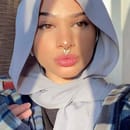September 23rd is International Bi-Visibility Day, reserved specially to generate awareness and appreciation for all bisexual folks, the adversities we face, and the general awesomeness we bring into the world. But if someone had told me a year ago today that I would have been referencing bisexuality with the words “we” and “us”, I probably would have fainted.
Up until seven months ago, I was knee-deep in internalized queer- and biphobia. In other words, I had absorbed the demeaning beliefs society projects about the queer community and directed that harm inwards against myself. It took exposure to the work of some amazing colleagues on campus, as well as falling in love (for real this time, I swear), to come face-to-face with my identity and strut on out of the closet.
Realistically, it all began in the 6th grade: some of my female friends and I were discussing an MTV show and a lesbian character on it. One of my friends asked, “Do you guys think you could ever like-like a girl?”. Among the following choruses of “No”s and “Nah”s, my quiet voice chimed in with an “I don’t know”.
And this was true – I didn’t know. Despite any inclinations I may have had up to that point, there was no representation or education about what I was feeling. Queer relationships are not privileged with spotlight treatment and thus, coupled with my Christian upbringing, all I understood was that boys liked girls and girls liked boys, period. The most radical statement I could have made at age ten was a flustered “I don’t know”.
Fast-forward ten years and this simple unawareness transformed into a battle with ignorance. It took a long, grueling time fighting with my sexuality until I realized that I was not the issue – the systemic discrimination against bi folks and promotion of bi-erasure were the issues. They robbed me of my identity and told me I was indecisive, attention-seeking, or hell-bound.
When it came to outing myself to my boyfriend, I was petrified beyond belief – so much so, that instead of an in-person conversation, I went straight back to 2002 and hit up good old e-mail. I asked him beforehand to name all the possible reasons that he might leave me for, because I wanted to be prepared for the worst. What if he somehow felt betrayed or didn’t accept me? What if he lashed back?
But in fact, he did just the opposite. As I huddled by my phone waiting for an incoming breakup text, I was met with a flourish of affirmation. In tears of joy, he exclaimed that he was so proud of me for discovering and accepting this part of myself. To this day, he is still committed to standing by my side as I navigate my identity and what it means to me. Needless to say, I was a mess for the rest of the night, but thankfully in a way I didn’t even expect.
Since that day, I’ve grown increasingly proud in who I am and what I represent. My bisexuality transformed from something to be ashamed of to a hallmark of my beauty as a human being.
That being said, I must acknowledge how privileged I am to have a partner that so enthusiastically accepts me. For many others, this very situation could have ranged from awkward and awry to downright violent. And as well, I am not entirely safe in my proclamation: having to write this letter anonymously signifies the harm I could face, particularly from family, if I was out all the way.
The bisexual community faces specific barriers and discrimination which, in a binary society, can largely impede our success in life from work and school to self-love. It’s my hope that this Bi-Visibility Day/Awareness Week, more bisexual people feel empowered to accomplish an act of self-love, whether that looks like coming out to your own self, connecting with other 2SLGBTQ+ folks, relaxing on your own, or sending your S/O a flamingly queer email.
Check out these resources on campus related to queer health:
- Advocates for a Student Culture of Consent (ASCC) – a research and action group under Laurier Students’ Public Interest Research Group (LSPIRG).
- Queer Sphere – a collective under Laurier’s Centre for Student Equity, Diversity and Inclusion (CSEDI). Weekly meetings are held Tuesdays at 10pm in CB207.
- Consent Is Golden – a collective operated by Laurier’s Sexual Violence Response Coordinator and Prevention Specialist, centering on consent advocacy and support.
- Laurier Wellness Centre
- Sexual Assault Centre of Brant


